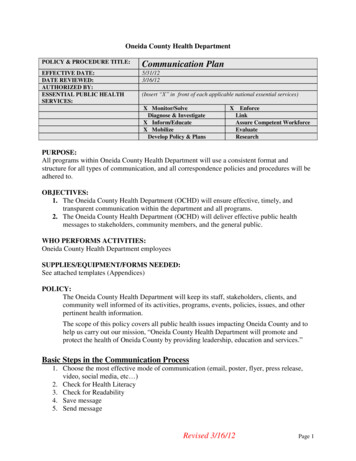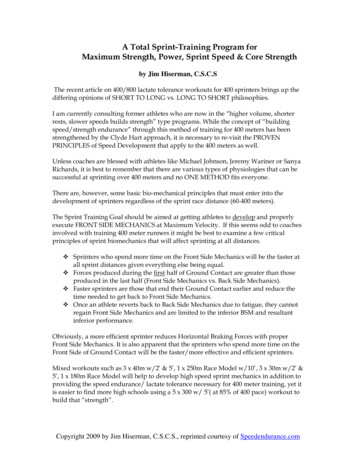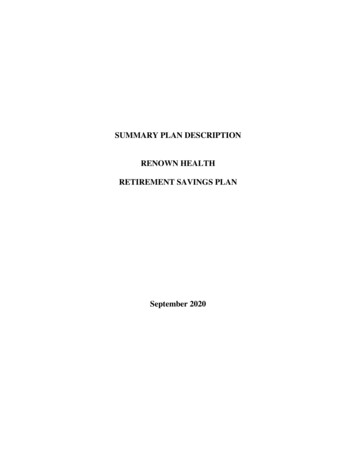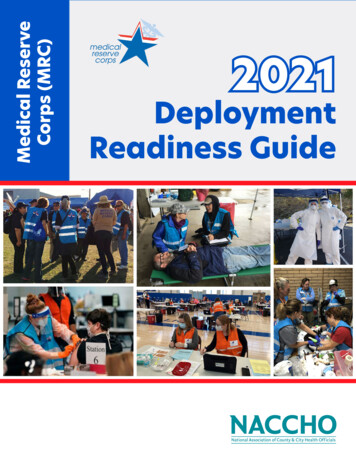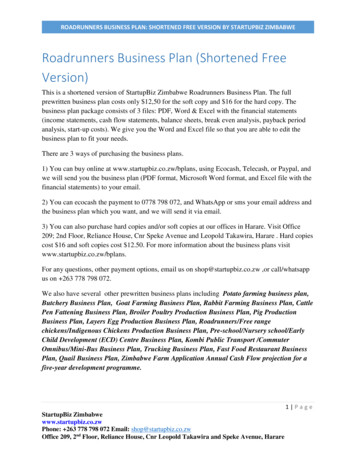
Transcription
TRAINING PLANPrologue:The Medical Reserve Corps (MRC) Training Plan is a suggested guide for training MRCVolunteers at the local level. It presents a “menu” of options to guide MRC Unit leaders andvolunteers with trainings that align with the Competencies for Disaster Medicine and PublicHealth (DMPH). The DMPH Competencies represent the baseline level of knowledge and skillsthat all MRC volunteers should have, regardless of their roles within the MRC unit. Because theDMPH competencies only establish a minimum standard, units may choose to expand on thecompetencies in order to train volunteers at a more advanced level.MRC units can choose trainings from the training matrix, use other trainings not listed in thematrix, or create their own unit-specific trainings based on the DMPH competencies.For an in-depth look and detailed information about the revised MRC Volunteer CoreCompetencies, view the self-paced eLearning module “MRC Volunteer Core Competencies: AnIntroduction and Overview”. This course is accessible via MRC-TRAIN (www.mrc.train.org)Course ID1057558 or via NACCHO University (http://naccho.org/university).How to Use the MRC Volunteer Training Matrix:The MRC Core Competencies Training Plan is organized into the following four categories:Learning Paths are groups of competencies related to certain topics that align with volunteermotivations. The learning paths may help you conceptualize how the Competencies forDisaster Medicine and Public Health relate to volunteer motivations. One training may coverone or all of the competencies within a learning path. The four learning paths are VolunteerPreparedness, Volunteer Response, Volunteer Leadership, and Volunteer Support forCommunity Resiliency.Disaster Medicine and Public Health (DMPH) Competencies serve as the foundationalcompetency set for MRC volunteers and represent a baseline level of knowledge and skillsthat all MRC volunteers should have, regardless of their role within the MRC unit. They arewidely understood to be the knowledge needed for a health care professional and/or firstresponder to perform a task in a safe and consistent manner.MRC Performance Qualifications break down the DMPH Competencies into MRC specificmeasurable actions (knowledge, skills, and attitudes) that a volunteer should be able toperform in order to be considered competent in an area.Suggested Trainings/Tools are recommended resources and trainings, most of which areavailable on-line and free of cost, that will enable volunteers to meet the competencies. Thetraining list is not comprehensive, rather it is a starting point for unit leaders to consider. Thetrainings are accessible through MRC-TRAIN.
TRAINING PLANLearning Path: Volunteer PreparednessDMPH Competency1.0 Demonstrate personal andfamily preparedness for disastersand public health emergenciesMRC Performance QualificationsComplete a personal and familypreparedness plan.Suggested Trainings/toolsIS-909 Community Preparedness:Implementing Simple Activities for Everyone(1031352)Your Family Disaster Plan (1029644)Personal Preparedness (1008945)Animal Emergency Preparedness(1025307)5.0 Demonstrate knowledge ofpersonal safety measures that canbe implemented in a disaster orpublic health emergencyDemonstrate safe behaviors duringMRC Activities.Personal Protective Equipment (PPE)(1051588)IS-5.a An Introduction to HazardousMaterials (1011884)Occupational Health for Public HealthResponders (Basics of Public HealthPreparedness, Module 6) (1046406)Health and Safety in Disaster Recovery(1052231)Disaster Responder Health and Safety(1037220)HAZMAT for Healthcare Providers:Awareness Level (1048614)Last update: 4/3/18
TRAINING PLANLearning Path: Volunteer ResponseDMPH Competency2.0 Demonstrate knowledge ofone's expected role(s) inorganizational and communityresponse plans activated during adisaster or public health emergencyMRC Performance QualificationsFollow procedures to successfullyactivate, report and demobilize.Follow policies and procedures relatedto professional and ethicalrepresentation of the MRC.Suggested Trainings/ToolsMRC Factors for Success: Alerting,Activating, and Demobilizing Volunteers(1052374)IS-100.B: Introduction to Incident CommandSystem (1024627)Describe the chain of command (e.g.NIMS, ICS, EMS) during MRCactivities.4.0 Communicate effectively withothers in a disaster or public healthemergency6.0 Demonstrate knowledge ofsurge capacity assets consistentwith one's role in organizational,agency, and/or communityresponse plansDescribe the member’s communicationresponsibilities and procedures.Risk Communication (1009111)Public Health Information & Data Tutorial(1005318)Surge Capacity for Disasters: The PotentialRole of the Community and Public HealthNurse (1008833)Describe how MRC serves thecommunity.IS-26 Guide to Points of Distribution(1017010)Mass Dispensing Overview: An SNSPerspective (1054681)7.0 Demonstrate knowledge ofprinciples and practices for theclinical management of all ages andpopulations affected by disastersand public health emergencies, inaccordance with professional scopeof practiceIdentify the impact of an event on thebehavioral health of the MRC memberand their family, team, and community.Describe how MRC serves thecommunity.Psychological First Aid (PFA) Online(1022214)Disaster Mental Health Assistance in PublicHealth Emergencies: Evidence-InformedPractices for Public Health Workers(1037365)Disaster Triage for Epidemics (1012019)Demonstrate cultural humility duringMRC activities.Last update: 4/3/18Nurses on the Front Line: Preparing for andResponding to Emergencies and Disasters(1013008)
TRAINING PLANLearning Path: Volunteer LeadershipDMPH Competency3.0 Demonstrate situationalawareness of actual/potential healthhazards before, during, and after adisaster or public health emergencyMRC Performance QualificationsDescribe how MRC serves thecommunity.Suggested Trainings/toolsChemical Emergencies and the Role ofPublic Health (1032732)You are the Help Until Help Arrives(1069847)Disability and Disaster (1052223)8.0 Demonstrate knowledge ofpublic health principles andpractices for the management of allages and populations affected bydisasters and public healthemergencies.Demonstrate cultural humility duringMRC activities.Disaster Service Worker (DSW) (1017965)Describe how MRC serves thecommunity.Latinos During Emergencies: CulturalConsiderations Impacting DisasterPreparedness (1041124)Identify the role of public health in thecommunity.Risk Communication for High Risk and AtRisk Populations (1032688)Culture & Health Literacy: Beyond Access(1014435)Last update: 4/3/18
TRAINING PLANLearning Path: Volunteer Support for Community ResiliencyDMPH Competency9.0 Demonstrate knowledge ofethical principles to protect thehealth and safety of all ages,populations, and communitiesaffected by a disaster or publichealth emergency.MRC Performance QualificationsFollow policies and procedures relatedto professional and ethicalrepresentation of the MRC.Applying Ethical Frameworks During SeverePandemic Influenza (1023487)Demonstrate cultural humility duringMRC activities.Demonstrate safe behaviors duringMRC activities.10.0 Demonstrate knowledge oflegal principles to protect the healthand safety of all ages, populations,and communities affected by adisaster or public healthemergency.11.0 Demonstrate knowledge ofshort- and long-term considerationsfor recovery of all ages,populations, and communitiesaffected by a disaster or publichealth emergencySuggested Trainings/toolsGood Decision Making in Real Time: PublicHealth Ethics for Local Health Officials(1050534)Follow policies and procedures relatedto professional and ethicalrepresentation of the MRC.Demonstrate cultural humility duringMRC activities.Identify the impact of an event on thebehavioral health of the MRC member,their family, team and community.Demonstrate cultural humility duringMRC activities.Last update: 4/3/18Law and Ethics in Public Health (PublicHealth Ethics, Module 4) (1050892)Public Health and the Law: An EmergencyPreparedness Training Kit (1050167)HIPAA: An Overview (1041019)Lega Aspects of Public Health EmergencyPreparedness (1051021)Long Term Recovery Basics (1052226)Social Media and Long-term Recovery(1052242)
agency, and/or community response plans Describe how MRC serves the community. Surge Capacity for Disasters: The Potential Role of the Community and Public Health Nurse (1008833) IS-26 Guide to Points of Distribution (1017010) Mass Dispensing Overview: An SNS Perspective (1054681) 7.0 Demonstrate knowledge of principles and practices for the

